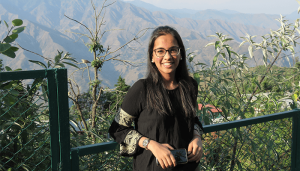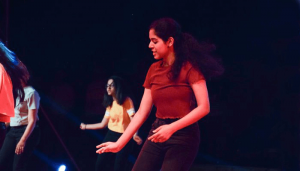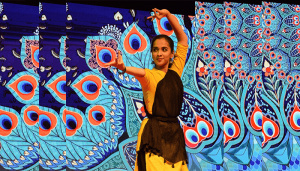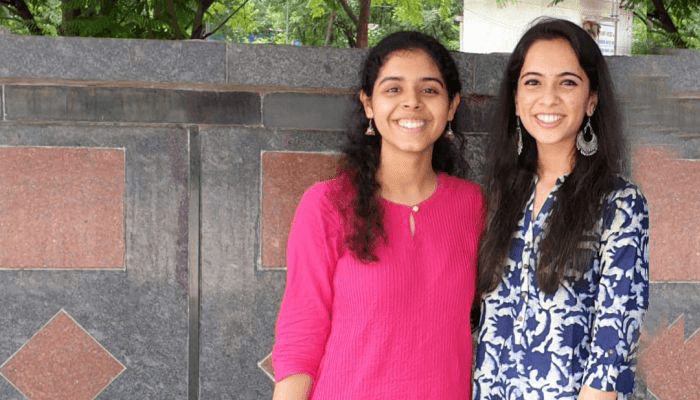Having just wrapped up their Google STEP internship, Shradha Sehgal and Mallika Subramanian speak at length about their virtual internship experience, girls in STEM and are all praise for IIITH’s unique curriculum that lets one explore diverse topics of interest.
Early this year when Coronavirus came a-calling, the IT&ES sector was the first to quickly transition into a work-from-home mode to ensure employee safety and business continuity. Soon even other traditional businesses hopped onto online models. Since a majority of the technical internships at big IT companies happen during Summer, it was natural for them to opt for the virtual mode too. Google which has been running summer internships since 1999 stepped in quickly to ensure that the internship tradition would continue, albeit virtually. And thousands of interns across the world logged into their various internship programmes from their homes.
Two second year BTech CS students from IIITH similarly accessed the Google network to work on their summer projects. Shradha Sehgal and Mallika Subramanian were among 33 others chosen from various engineering institutes across India for Google’s STEP program.

An acronym for Student Training in Engineering Program, STEP is a 12-week internship program for second year undergraduate students studying Computer Science. Like the Google website states, the focus of this program is to provide development opportunities to “students from groups historically underrepresented in tech”. Since the fields of Science, Technology, Engineering and Math (STEM), have long been dominated by males with very low female participation, the aim of the program is to give technical training and professional development support to female Computer Science undergraduates who have a passion for technology.
Virtual Coffees and Conversations
Speaking of how Google allayed their fears of uncertainty amidst the sudden enforced lockdown, Shradha says, “When the pandemic broke out, unlike other companies, Google was quick to inform us that the internships would be conducted in a virtual set up which was not only comforting but also very helpful to help us plan things. They got in touch with us and made sure there were no doubts about how the virtual internship would proceed,” adding that despite the strict restrictions in place at the time, they even delivered equipment such as laptops and monitors to all of them.

In addition to the opportunity of working on a challenging project, a huge part of the internship experience at Google has to do with experiencing their work culture and benefitting from working alongside experienced Googlers. To ensure that many aspects of the program itself remained unchanged, the company had to make some adjustments to ensure that the Google experience wasn’t diluted and the interns continued to have fun. STEP interns work in teams of 3 under the supervision of a host and a co-host who are full-time employees. While online team interactions are high due to the nature of the work, a conscious effort was made so that the interns don’t miss out on networking, mentoring from Google engineers and enrichment through technical talks and presentations by other Googlers. “Our team released a sheet of all the employees in the team and their availability for any day. We could send out a calendar invite and book slots, get on a 1:1 conversation with them and chat for about 30-40 mins. I spoke to several people in this manner and they’re all very very comfortable with that. There is no formality at all,” says Mallika. A similar networking mechanism exists at the global level too. Known as a ‘Virtual Coffee’, any intern anywhere in the world can apply by listing specific interests and get mapped to like-minded others who share similar pursuits.

Current and Relevant Projects
An internship helps give a student a first-hand exposure to the real professional world. Shradha terms her Google experience as an empowering one because she got an opportunity to work on a current, real-life situation. Working with the Google Ads team, she helped design an experimental app called Virtual Queues. As the name suggests, it is an online queuing system that assigns virtual tokens to shoppers, suggesting stores they could visit based on their location, drive time, length of existing queue and so on. “The motivation behind it was that in the face of Covid-19, with the lockdown being lifted, a lot of people were queuing up at stores, causing commotion and not practising social distancing. With this app, you can also visualise how many people are already there in the queue, and how it is moving. By minimising crowds, the app can benefit both the shop keeper as well as the customer,” says Shradha.
Mallika worked with the User Generated Content team for Google Maps, where she assisted in building a time lapse visualiser for customizable geographic data sets. Her project aimed to deduce information and view certain trends with the help of filters and other features, on huge geographic data sets. “The motivation behind developing such a visualiser was that since the team works with huge data sets that are labelled by area, they can now plug in their data and view trends such as where the maximum spam edits are coming from or where the maximum incorrect phone number edits are coming from,” explains Mallika.
Dancing To The Same Beat
While some degree of academic proficiency is expected from aspiring interns, resumes for the STEP program are shortlisted for two rounds of technical interviews based on an array of interests demonstrated by the undergraduates. In Mallika’s case, her presence on campus-related extra curricular activities such as heading the Design team of the college magazine, Ping! drew recruiters’ attention. “While I started off by writing a couple of articles for the magazine, I realised that I like designing more!” she exclaims. She is self-taught and has picked up Adobe tools such as Photoshop, InDesign and Illustrator which she uses to design articles, posters and even their newspaper. As a freshman, she was also actively associated with the Entrepreneurial cell (E-cell) on campus as a member of the Events and Logistics team. “I got to know how the whole process of organising events works especially Megathon which is an annual event. I witnessed the entire cycle from contacting companies, getting them to come to campus, providing them the problem statement and so on.” In the second year, she was part of the social media team where her role involved spreading awareness about the entrepreneurship culture on campus, especially to freshers.

Interestingly, besides being roommates, the IIITH STEP interns, Mallika and Shradha have many other things in common. They are both dance coordinators of the dance crew at IIITH. While Mallika is a trained bharatnatyam dancer having 15 years of experience in the field, Shradha is an avid jazz dancer. Growing up in Delhi, she took to Jazz dancing as early as in 8th grade and has not looked back since. “I love to dance. It helps me unwind and keeps my mind off clutter,” she says. The duo continues to organise dance-related activities even in a virtual set up. “We don’t want to let the lockdown hinder us. Just last weekend, we had an online dance session called ‘Footloose Sunday’ where we got together with a bunch of people and danced over video call,” recalls Shradha. With a variety of dance forms and dancers on campus, Shradha was prompted to explore other forms of dancing and avenues too. “I have tried a diverse variety of styles over the last few years. We regularly hold workshops and take part in fests. We danced in Felicity and we were responsible for the flash mob too,” she says.

STEPping into STEM
The girls are all praise for their institution, IIITH which they credit with giving them unique opportunities for self-exploration. Speaking of the way the curriculum is designed enabling acquisition of skills in the first year itself, Mallika says, “Our Data Structures and Algorithms course is taught so well in our first year that our foundation becomes really strong and we can practise from then on”. She goes on to say that students have the choice of opting for some electives that are otherwise not mandatory for their coursework, thus giving them a sneak peek into a relatively new world. “I’m not a MS by Research student in Computational Natural Sciences and yet this semester, I could choose Quantum Computing which I found quite interesting,” she says.
Shradha calls herself a jack of all trades. “I like to dabble or try my hand at everything at least once,” she grins. While still unsure about where her deep interests lie, like Mallika, she is grateful to the institute for providing a gamut of experiences. “Besides the active competitive programming culture that is often talked about, IIITH offers a great platform to students – from giving us an industry exposure with courses like the SSAD (Software Development course) to dabbling in research through the honours program.” The duo has currently signed up for the Honours program where alongside the BTech degree, they are working on research projects under Prof. Ponnurangam Kumaraguru, IIIT Delhi.
About the internship itself, Mallika and Shradha say in unison that the opportunity, coming as early as in the second year, is a great channel for inducting more girls into STEM. They had a great time interacting with 33 other girls from across the country in both hardware and software roles. “It is true that there is a severe dearth of females in STEM particularly Computer Science, so it was great to be surrounded by such talented and unique girls. One of my team mates said she was one of only three girls in the Computer Science branch in her college. So that came as a shock to me,” says Shradha. “With the internship experience, where we grew not just professionally but also personally, coupled with the Honours program, we will be exposed to both industry as well as research, helping us take a more informed decision about what next when we graduate,” sums up Mallika.

Sarita Chebbi is a compulsive early riser. Devourer of all news. Kettlebell enthusiast. Nit-picker of the written word especially when it’s not her own.


Next post